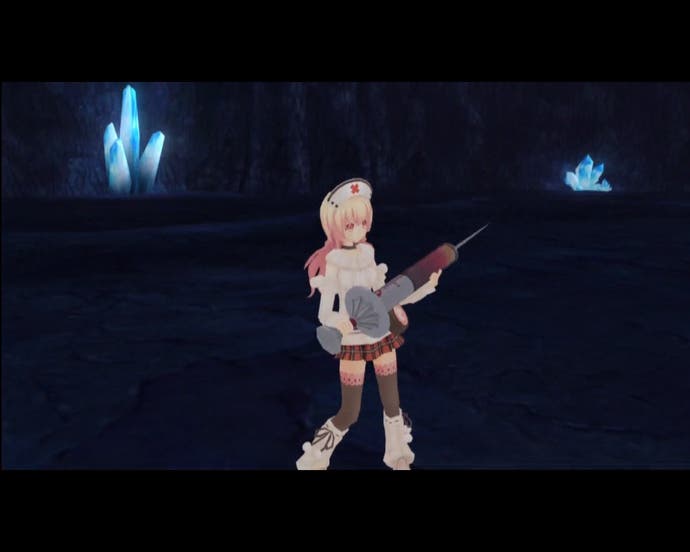Hyperdimension Neptunia
Game will eat itself.
The action is limited to dungeons: there are no towns or over-world to explore here, with each new dungeon selected from a drop-down menu. The dungeons themselves are relentlessly simple and uninteresting; dull, repetitive corridors furnished by invisible monsters that interrupt your progress with archaic random battles.
The battle system too is a shadow of what it could have been. Borrowing from Square-Enix's classic PSone RPG Xenogears, each of your characters is given a stock amount of Action Points during their turn. You are then free to create four-part attack combos from that character's three stock attacks, the order of attacks resulting in different effects.
Some combo strings have a special finishing move attached that will see your character transform into a more powerful version of themselves for the rest of the battle, but as the attacks that are available to you remain the same, it's little more than a graphical and statistical upgrade.
While the system appears to be interesting at first, the lack of any meaningful character progression in terms of raw attack abilities ensures that after five minutes you will have explored and mastered most of its idiosyncrasies. The long, ponderous attack animations draw battles out unnecessarily, and so more often than not you'll hit the skip button to fast forward to the next attack.
In time, you find yourself entering a string of attacks and then tapping away at the skip button, merely glancing at the monster's health bar as it depletes. It's spreadsheet gaming, and the lack of any real need for strategy ensures it's lifeless and uninteresting.

One of the most puzzling design choices in a game filled with wrong-headed decisions is the way in which healing items cannot be manually administered to wounded allies. Rather, restorative actions are randomly triggered during the course of battle.
The only power you have is in allocating points to each character's item skills, a figure that increases the likelihood that they will be randomly triggered during a battle. As such the only definite actions you can make during the course of a fight are offensive ones, and the lack of control over healing your party (you're even restricted from using the heal command outside of battle) is irritating and idiotic.
It's frustrating that, of all the great many Japanese games that should be picked up for Western release, Nippon Ichi has chosen Hyperdimension Neptunia. On paper, the premise is a solid one, but the execution disappoints on every level.
Even the most ardent JRPG fan will baulk at the roughshod simplicity of the game's systems, restricting the game's audience to Japanophile anime fans who can overlook the experiences shortcomings as a videogame and approach it as a cultural curio. That is, a sexist, senseless and ultimately stupid cultural curio.








